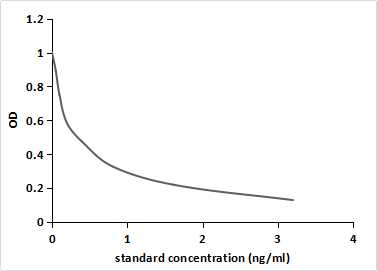Monoclonal Antibody to Cyanocobalamin (CNCbl) 

VB12; Vitamin B12; Cobalamin; α-5,6-Dimethylbenzimidazolyl Cobamidcyanide
- UOM
- FOB US$ 126.00 US$ 294.00 US$ 420.00 US$ 1,050.00 US$ 4,200.00
- Quantity
Overview
Properties
- Product No.MAA924Ge21
- Organism SpeciesPan-species (General) Same name, Different species.
- ApplicationsELISA
If the antibody is used in flow cytometry, please check FCM antibodies.
Research use only - DownloadInstruction Manual
- CategoryMetabolic pathwayNutrition metabolism
- SourceMonoclonal antibody preparation, Host Mouse
- Ig Isotype IgG2b Kappa, Clone Number C3
- PurificationProtein A + Protein G affinity chromatography
- LabelNone
- Immunogen CPA924Ge11-BSA Conjugated Cyanocobalamin (CNCbl)
- Buffer Formulation0.01M PBS, pH7.4, containing 0.05% Proclin-300, 50% glycerol.
- TraitsLiquid, Concentration 1mg/mL
Sign into your account
Share a new citation as an author
Upload your experimental result
Review

Contact us
Please fill in the blank.
Specifity
The antibody is a mouse monoclonal antibody raised against CNCbl. It has been selected for its ability to recognize CNCbl in ELISA and CLIA.
Usage
Enzyme-Linked Immune Immunosorbent: 0.2ng/mL;
Optimal working dilutions must be determined by end user.
Storage
Store at 4°C for frequent use. Stored at -20°C in a manual defrost freezer for two year without detectable loss of activity. Avoid repeated freeze-thaw cycles.
Stability
The thermal stability is described by the loss rate. The loss rate was determined by accelerated thermal degradation test, that is, incubate the protein at 37°C for 48h, and no obvious degradation and precipitation were observed. The loss rate is less than 5% within the expiration date under appropriate storage condition.
Giveaways
Increment services
Citations
- Vitamin Status and the Development of Postoperative Cognitive Decline in Elderly Surgical Oncologic Patients.pubmed:29058145
- Selected Risk Nutritional Factors for Chemotherapy-Induced Polyneuropathy.pubmed:28587059
- Lettore di micropiastre multimodale:
- Vitamin A, C, D, E and B12 Levels in Leprosy: A Case Control Study
- Folate, Vitamin B12, and Homocysteine Levels in Women With Neural Tube Defect-Affected Pregnancy in Addis Ababa, EthiopiaPubmed:35464038









